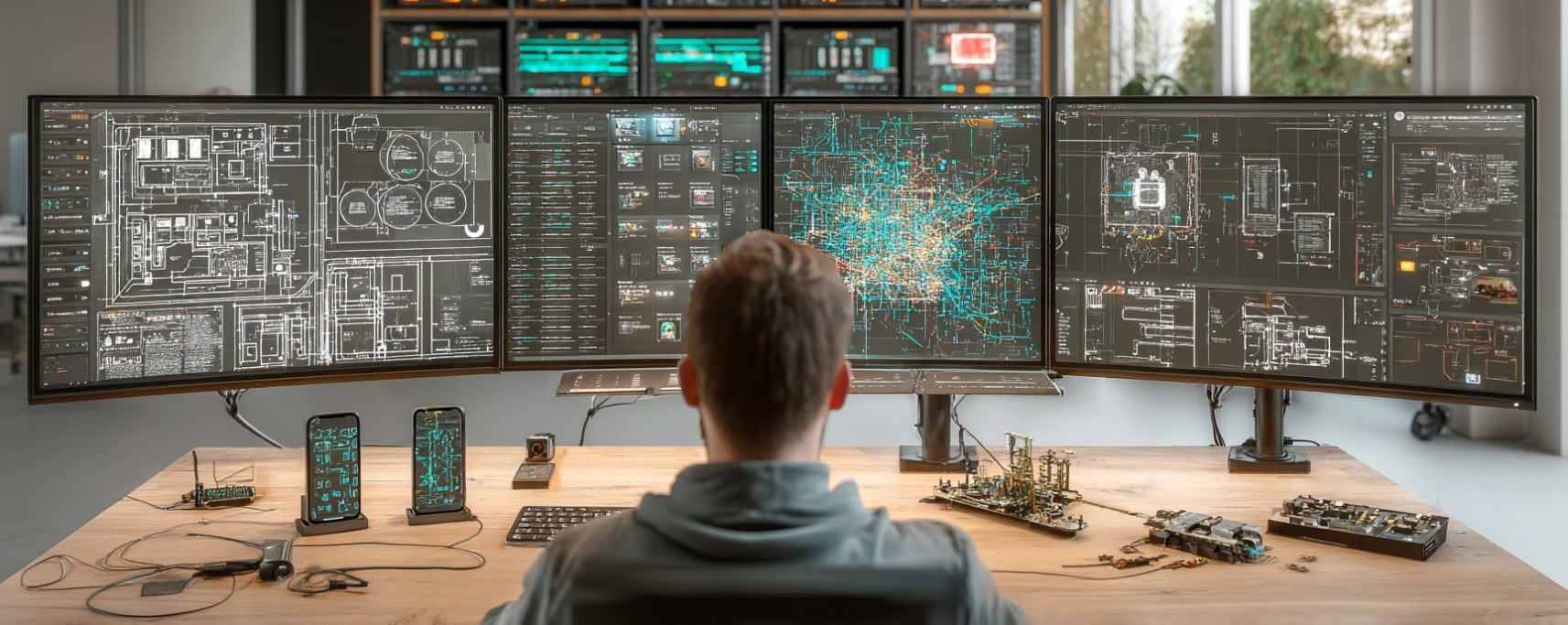If you’re fascinated by the workings of machines, automation, and technology-driven solutions, deciding between mechatronics and mechanical engineering can shape your entire career path. Both fields play crucial roles in advancing innovation and industry, yet each offers distinct approaches, skillsets, and career opportunities.
Mechatronics blends mechanical systems with electronics, computing, and control systems, leading to cutting-edge roles in robotics, automation, and smart manufacturing. Mechanical engineering, on the other hand, maintains a strong focus on the fundamental principles of mechanics, energy, and materials, underpinning roles across aerospace, automotive, and industrial design.
Key Similarities
Educational Foundations
Both mechatronics and mechanical engineering are rooted deeply in STEM (science, technology, engineering, and mathematics) disciplines. Students pursuing these types of engineering degree programs will encounter rigorous coursework that heavily emphasizes physics, mathematics, and foundational engineering principles.
Common areas of overlap include courses in:
- Mechanical and structural design
- Thermodynamics and heat transfer
- Control systems and instrumentation
- Basic electrical circuits and programming
This shared educational groundwork ensures that students from either discipline gain a versatile engineering foundation, opening doors to various types of engineering careers.
Core Skills
In addition to overlapping academic curricula, both fields cultivate essential engineering skills, such as:
- Problem-solving and analytical thinking
- Effective teamwork and communication
- Proficiency in computer-aided design (CAD) software
- Competence in product development, testing, and quality assurance
These skills prepare graduates to navigate complex projects and contribute meaningfully in diverse engineering roles, whether in traditional manufacturing or advanced technological applications.
Key Differences
Disciplinary Focus
Mechatronics emphasizes the integration of multiple engineering domains, including mechanical, electrical, computer, and control systems. Professionals in this field develop sophisticated, interconnected systems such as automated machinery, robotics, and smart devices.
In contrast, mechanical engineering maintains a narrower disciplinary focus on mechanical systems, dynamics, energy transfer, and manufacturing processes. It involves designing, analyzing, and optimizing machinery and mechanical components, often relying more heavily on classical engineering principles and material science.
Technological Integration
Mechatronics engineering frequently incorporates cutting-edge technologies like robotics, automation systems, artificial intelligence, and the Internet of Things (IoT). Engineers in this field often work at the intersection of hardware and software to create smart, automated solutions.
Mechanical engineering, while increasingly influenced by digital advancements, traditionally emphasizes the design and optimization of mechanical structures, engines, HVAC systems, and material applications. It involves working predominantly with tangible machinery and physical systems.
These distinct technological orientations mean that mechatronics engineers typically find themselves at the forefront of emerging technology trends, while mechanical engineers often excel in more established industries such as automotive, aerospace, and industrial manufacturing.
Educational Requirements
Degrees Offered
When comparing mechatronics vs. mechanical engineering education requirements, students will find distinct degree options tailored to each discipline:
- Mechatronics:
- A mechatronic engineering bachelor’s degree typically emphasizes coursework in robotics, programmable logic controllers (PLCs), automation, sensors, and microcontrollers.
- A mechatronic engineering master’s degree further specializes in advanced automation, integrated intelligent systems, and robotics engineering.
- A mechatronic engineering bachelor’s degree typically emphasizes coursework in robotics, programmable logic controllers (PLCs), automation, sensors, and microcontrollers.
- Mechanical Engineering:
- A mechanical engineering bachelor’s degree focuses heavily on thermodynamics, fluid dynamics, mechanical system design, materials science, and manufacturing processes.
- A mechanical engineering master’s degree typically provides advanced study opportunities in energy systems, aerospace engineering, manufacturing technology, and materials engineering.
- A mechanical engineering bachelor’s degree focuses heavily on thermodynamics, fluid dynamics, mechanical system design, materials science, and manufacturing processes.
Additionally, students interested in flexible study formats may consider an online engineering bachelor’s degree or an online engineering master’s degree program to accommodate their scheduling needs without compromising on academic quality.
Accreditation and Licensing
Both mechatronics and mechanical engineering degree programs commonly hold accreditation from ABET (Accreditation Board for Engineering and Technology). Accreditation ensures the curriculum meets strict educational standards, preparing graduates effectively for their professional careers.
Mechanical engineers frequently pursue professional licensure, beginning with the Fundamentals of Engineering (FE) exam, eventually leading to a Professional Engineer (PE) license after gaining sufficient industry experience.
In contrast, licensing pathways for mechatronics professionals can vary depending on their specific career focus. Some pursue a PE license, particularly if their role involves critical safety or design responsibilities, while others rely primarily on specialized industry certifications and practical experience.
Job Roles and Responsibilities
Understanding mechatronics vs. mechanical engineering job duties is crucial when choosing your career path. Each field offers distinct responsibilities and industries where professionals typically thrive.
Mechatronics Engineer
Mechatronics engineers specialize in designing and developing automated, integrated systems combining mechanical, electronic, and computing components. Typical responsibilities include:
- Designing automated equipment, robotics, and control systems.
- Developing solutions for manufacturing automation.
- Working with consumer electronics, biomedical devices, and smart technology products.
- Programming and troubleshooting embedded systems and robotic controllers.
Common industries for mechatronics engineers include advanced manufacturing, robotics, automotive automation, consumer electronics, healthcare technology, and aerospace systems.
Mechanical Engineer
Mechanical engineers primarily design, analyze, and optimize mechanical systems and machinery. Their responsibilities typically include:
- Designing and testing mechanical systems such as engines, HVAC systems, and industrial machinery.
- Overseeing product manufacturing and assessing quality assurance.
- Conducting thermal and stress analyses to ensure safety, reliability, and efficiency.
- Collaborating with multidisciplinary teams on large-scale projects.
Mechanical engineers commonly work in sectors like automotive manufacturing, aerospace engineering, defense contracting, construction, energy production, and industrial equipment design.
Job Outlook and Salary
When evaluating mechatronics vs. mechanical engineering salary, it’s important to consider both compensation and job growth potential. Each field offers competitive salaries and promising job outlooks, though specific opportunities can vary significantly based on industry and specialization.
Salary Comparison
Mechanical Engineering:
According to the U.S. Bureau of Labor Statistics (BLS), the median annual wage for mechanical engineers was $102,320 as of May 2024. Salaries varied significantly by industry, with mechanical engineers in scientific research and development services earning a median of $123,080, and those in machinery manufacturing earning about $96,690.
Mechatronics Engineering:
Although the BLS does not provide a distinct category for mechatronics engineers, their salaries typically fall within or slightly above those of mechanical engineers—especially in industries heavily reliant on automation, robotics, and smart manufacturing technologies. Professionals with specialized skills in advanced automation, AI integration, and robotics generally command higher salaries due to growing demand and specialized expertise.
Job Demand and Growth
Mechanical Engineering:
Employment of mechanical engineers is projected to grow 11 percent between 2023 and 2033, much faster than the average growth rate for all occupations, according to the BLS. This demand is driven by increased integration of automation and innovation within manufacturing sectors. Approximately 19,800 job openings are expected annually due to new job creation and the need to replace retiring professionals.
Mechatronics Engineering:
Mechatronics professionals are experiencing strong demand, particularly as industries rapidly adopt advanced robotics, artificial intelligence, and automated manufacturing systems. As smart manufacturing and integrated systems continue to expand across industries like automotive, aerospace, healthcare, and consumer electronics, employment opportunities for professionals skilled in mechatronics are expected to outpace traditional engineering roles, making this a particularly dynamic field for career growth.
Why Choose One Over the Other?
Choosing between mechatronics and mechanical engineering depends on personal interests, career aspirations, and evolving industry demands. Here are several considerations to help determine which field aligns better with your goals:
Personal Interests and Skills
- Mechatronics: Ideal if you enjoy integrating hardware with software, designing intelligent systems, and working with robotics or automated technologies. A strong interest in coding, electronics, and dynamic technological environments is beneficial.
- Mechanical Engineering: Suited to individuals passionate about mechanical design, structural analysis, energy systems, and hands-on interaction with machinery and materials. A preference for foundational engineering principles and tangible product development is key.
Industry Trends
- Mechatronics: This field is seeing substantial growth due to increased investment in automation, robotics, smart manufacturing, and artificial intelligence. If you’re intrigued by the future of technology and innovative solutions, mechatronics offers abundant opportunities.
- Mechanical Engineering: Continues to offer steady growth, particularly within industries like aerospace, automotive, energy, and defense, where mechanical innovation remains foundational.
Geographic and Job Market Considerations
- Regions with strong tech hubs, manufacturing centers focused on automation, or specialized industries like medical device technology often favor mechatronics expertise.
- Areas emphasizing traditional manufacturing, automotive production, aerospace, or energy sectors typically provide substantial career paths for mechanical engineers.
Ultimately, students should reflect on their own interests, strengths, and career visions, and weigh these factors carefully when deciding between mechatronics and mechanical engineering.
FAQ
Can Mechanical Engineers Work in Mechatronics Roles?
Yes, mechanical engineers often transition into mechatronics roles, particularly if they acquire additional skills in electronics, programming, automation systems, or robotics. Many professionals supplement their education with certificates, specialized training, or experience in integrated technologies to broaden their career opportunities.
Which Is Harder to Study?
Both disciplines require rigorous STEM-based education. However, mechatronics can be challenging for students less comfortable with software programming and electronics integration, whereas mechanical engineering typically demands deeper expertise in areas like thermodynamics, fluid dynamics, and materials science. The perceived difficulty often aligns with personal strengths and academic preferences.
Are There Hybrid Programs?
Yes, hybrid or interdisciplinary programs are increasingly common. Many universities offer mechanical engineering degrees with a concentration or minor in mechatronics or robotics, providing students with a balanced skillset and greater career flexibility upon graduation.
What Software Skills Are Essential for Each?
- Mechatronics engineers should be proficient in programming languages (such as C, Python, MATLAB), simulation software (LabVIEW), programmable logic controllers (PLCs), and robotics software frameworks (ROS).
- Mechanical engineers typically focus on advanced proficiency in computer-aided design (CAD) software (SolidWorks, AutoCAD), computational fluid dynamics (CFD) tools, finite element analysis (FEA) software, and product lifecycle management (PLM) systems.
Final Thoughts
Choosing between mechatronics and mechanical engineering involves considering your interests, career goals, and industry trends. Both fields offer rewarding paths with significant overlap but distinct opportunities. Take time to explore accredited programs, speak with professionals in each discipline, and select the path that best aligns with your strengths and aspirations.



